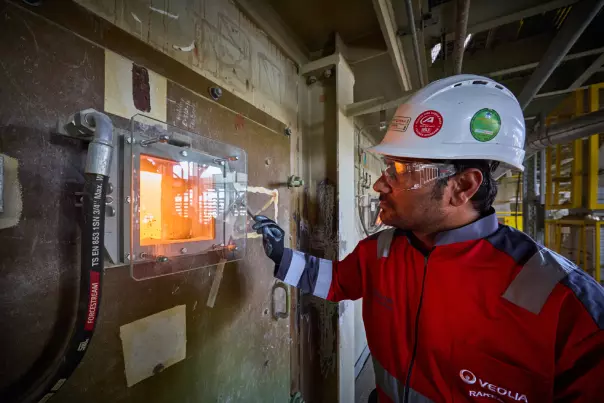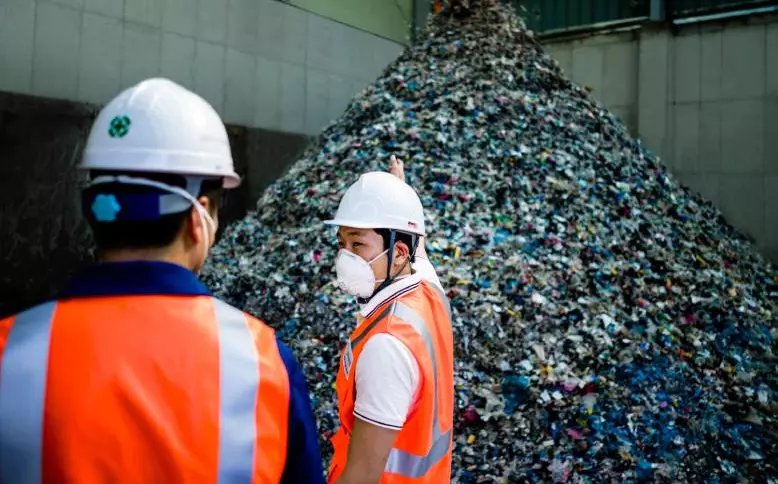In a world where every piece of waste can become a resource, energy recovery stands as a pillar of the circular economy and decarbonization. At Veolia, we harness this potential. Our state-of-the-art facilities don't just eliminate non-recyclable waste; they transform it into heat and electricity. This innovative approach creates local loops of decarbonizing energy, reducing reliance on fossil fuels and strengthening the energy independence of communities. By converting waste into heat and electricity where it's produced, we're forging a new, more resilient energy model.
Our solutions for recovering energy from waste
We support communities and industries in recovering energy from waste. Discover our solutions.
metric tons of treated waste by Veolia.
rate of energy production from treated waste by Veolia.
The Veolia difference
- You reduce your environmental footprint
- You secure and diversify your energy mix
- You comply with environmental regulations
- You lower your energy costs and create an additional source of income
- You gain access to the best strategies available on the market
- We help you find the best outlet for your carbon dioxide, with a beneficial and sustainable economic model
- You benefit from non-negotiable safety requirements

Learn more about recovering energy from wastes
Our solutions for energy recovery from communities and industrial waste:
Converting household waste into energy
Veolia offers innovative solutions for transforming household waste into green energy. Our more than 60 waste-to-energy plants worldwide recover the heat produced when household waste is incinerated to generate thermal and electrical energy. This approach makes it possible to supply district heating networks, heat greenhouses, or produce electricity that is then sold back to distributors. By offering a sustainable alternative to landfill, we help municipalities to adopt a circular economy approach while reducing their dependence on fossil fuels.
Harnessing biogas from landfill waste presents a major opportunity in the fight against climate change. At Veolia, we have developed comprehensive expertise, from the design to the post-closure care of landfill sites, to capture and transform this greenhouse gas into renewable energy. Our technologies enable the production of electricity, heat, and biofuel from the captured gas. Each year, we process over 14 million tons of landfill waste, generating 1.2 million MWh of electricity.
Through the production and energy recovery of Solid Recovered Fuel (SRF), Veolia offers a low-carbon alternative to landfilling and fossil fuels. We design, build, and operate complete facilities, from SRF preparation to incineration, generating heat and electricity for communities and industries. This innovative approach creates local jobs, reduces the carbon footprint, and fits perfectly within the transition to a circular economy and a greener energy mix.

Veolia transforms sewage sludge into green energy using innovative technologies. Our anaerobic digestion process enables local authorities and industrial companies to convert this residue into biogas, offering a renewable, low-carbon alternative to fossil fuels. We can purify this biogas into biomethane, which can then be injected into the public gas distribution network. In this way, we help our customers achieve energy autonomy and reduce their carbon footprint.
Veolia maximizes the value of biomass through a comprehensive range of solutions for collecting and processing this waste into renewable energy or recycled materials. Our expertise covers various types of biomass, from forestry waste to agricultural residues. We focus on energy recovery, producing heat and electricity for municipalities and industries, while also developing recycling channels for dry biomass. These initiatives help reduce reliance on fossil fuels and secure energy supplies for local communities.
Veolia is positioning itself across the carbon value chain to reduce its environmental footprint and that of its clients. Our expertise covers the capture, utilization, and storage of CO2 from industrial and municipal activities. We offer innovative solutions, from energy optimization and the capture of residual emissions to the utilization of CO2 in industrial processes or the production of synthetic fuels. Complementing our decarbonization solutions, these technologies fuel our Net Zero strategy.








